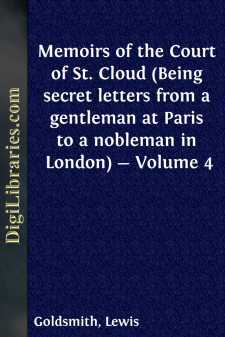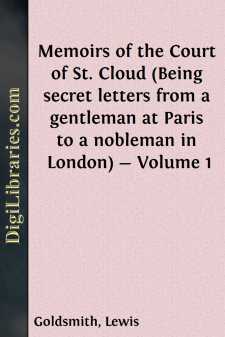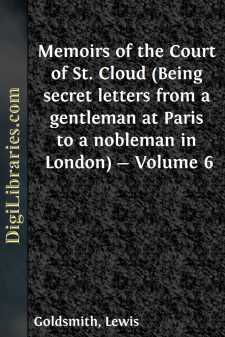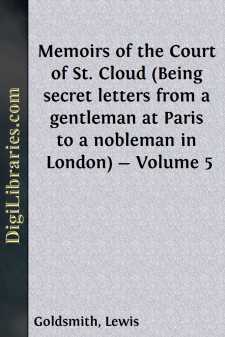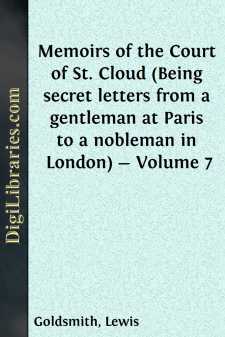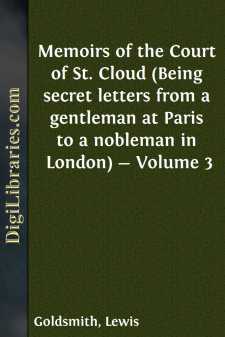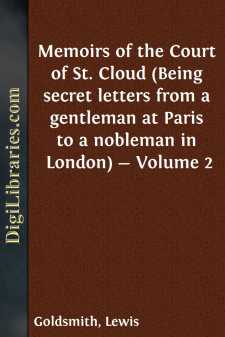Categories
- Antiques & Collectibles 13
- Architecture 36
- Art 48
- Bibles 22
- Biography & Autobiography 813
- Body, Mind & Spirit 142
- Business & Economics 28
- Children's Books 14
- Children's Fiction 11
- Computers 4
- Cooking 94
- Crafts & Hobbies 4
- Drama 346
- Education 46
- Family & Relationships 57
- Fiction 11829
- Games 19
- Gardening 17
- Health & Fitness 34
- History 1377
- House & Home 1
- Humor 147
- Juvenile Fiction 1873
- Juvenile Nonfiction 202
- Language Arts & Disciplines 88
- Law 16
- Literary Collections 686
- Literary Criticism 179
- Mathematics 13
- Medical 41
- Music 40
- Nature 179
- Non-Classifiable 1768
- Performing Arts 7
- Periodicals 1453
- Philosophy 64
- Photography 2
- Poetry 896
- Political Science 203
- Psychology 42
- Reference 154
- Religion 513
- Science 126
- Self-Help 84
- Social Science 81
- Sports & Recreation 34
- Study Aids 3
- Technology & Engineering 59
- Transportation 23
- Travel 463
- True Crime 29
Memoirs of the Court of St. Cloud (Being secret letters from a gentleman at Paris to a nobleman in London) - Volume 4
by: Lewis Goldsmith
Description:
Excerpt
PARIS, August, 1805.
MY LORD:—The Italian subjects of Napoleon the First were far from displaying the same zeal and the same gratitude for his paternal care and kindness in taking upon himself the trouble of governing them, as we good Parisians have done. Notwithstanding that a brigade of our police agents and spies, drilled for years to applaud and to excite enthusiasm, proceeded as his advanced guard to raise the public spirit, the reception at Milan was cold and everything else but cordial and pleasing. The absence of duty did not escape his observation and resentment. Convinced, in his own mind, of the great blessing, prosperity, and liberty his victories and sovereignty have conferred on the inhabitants of the other side of the Alps, he ascribed their present passive or mutinous behaviour to the effect of foreign emissaries from Courts envious of his glory and jealous of his authority.
He suspected particularly England and Russia of having selected this occasion of a solemnity that would complete his grandeur to humble his just pride. He also had some idea within himself that even Austria might indirectly have dared to influence the sentiments and conduct of her ci-devant subjects of Lombardy; but his own high opinion of the awe which his very name inspired at Vienna dispersed these thoughts, and his wrath fell entirely on the audacity of Pitt and Markof. Strict orders were therefore issued to the prefects and commissaries of police to watch vigilantly all foreigners and strangers, who might have arrived, or who should arrive, to witness the ceremony of the coronation, and to arrest instantly any one who should give the least reason to suppose that he was an enemy instead of an admirer of His Imperial and Royal Majesty. He also commanded the prefects of his palace not to permit any persons to approach his sacred person, of whose morality and politics they had not previously obtained a good account.
These great measures of security were not entirely unnecessary. Individual vengeance and individual patriotism sharpened their daggers, and, to use Senator Roederer's language, "were near transforming the most glorious day of rejoicing into a day of universal mourning."
All our writers on the Revolution agree that in France, within the first twelve years after we had reconquered our lost liberty, more conspiracies have been denounced than during the six centuries of the most brilliant epoch of ancient and free Rome. These facts and avowals are speaking evidences of the eternal tranquillity of our unfortunate country, of our affection to our rulers, and of the unanimity with which all the changes of Government have been, notwithstanding our printed votes, received and approved.
The frequency of conspiracies not only shows the discontent of the governed, but the insecurity and instability of the governors. This truth has not escaped Napoleon, who has, therefore, ordered an expeditious and secret justice to despatch instantly the conspirators, and to bury the conspiracy in oblivion, except when any grand coup d'etat is to be struck; or, to excite the passions of hatred, any proofs can be found, or must be fabricated, involving an inimical or rival foreign Government in an odious plot....


